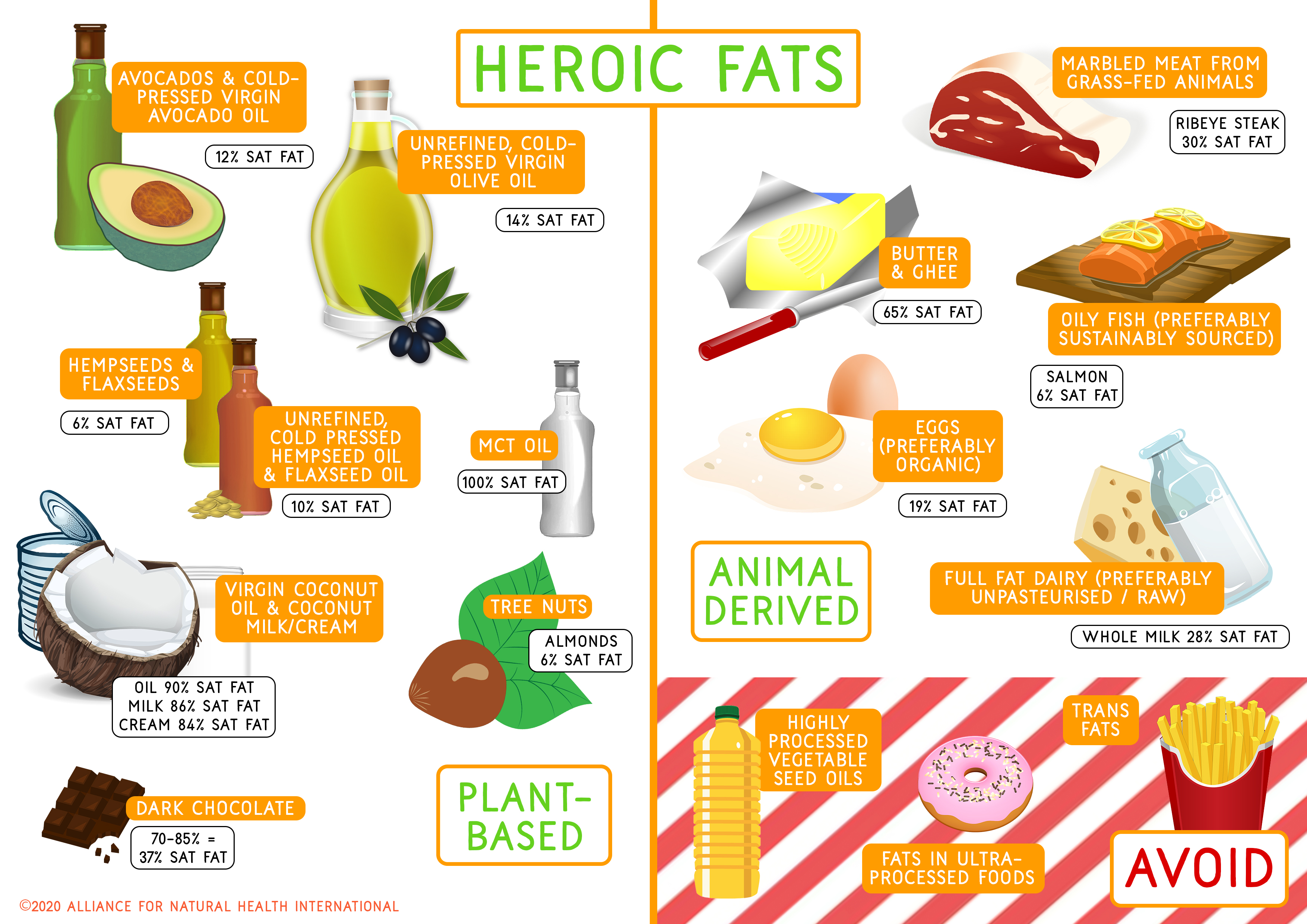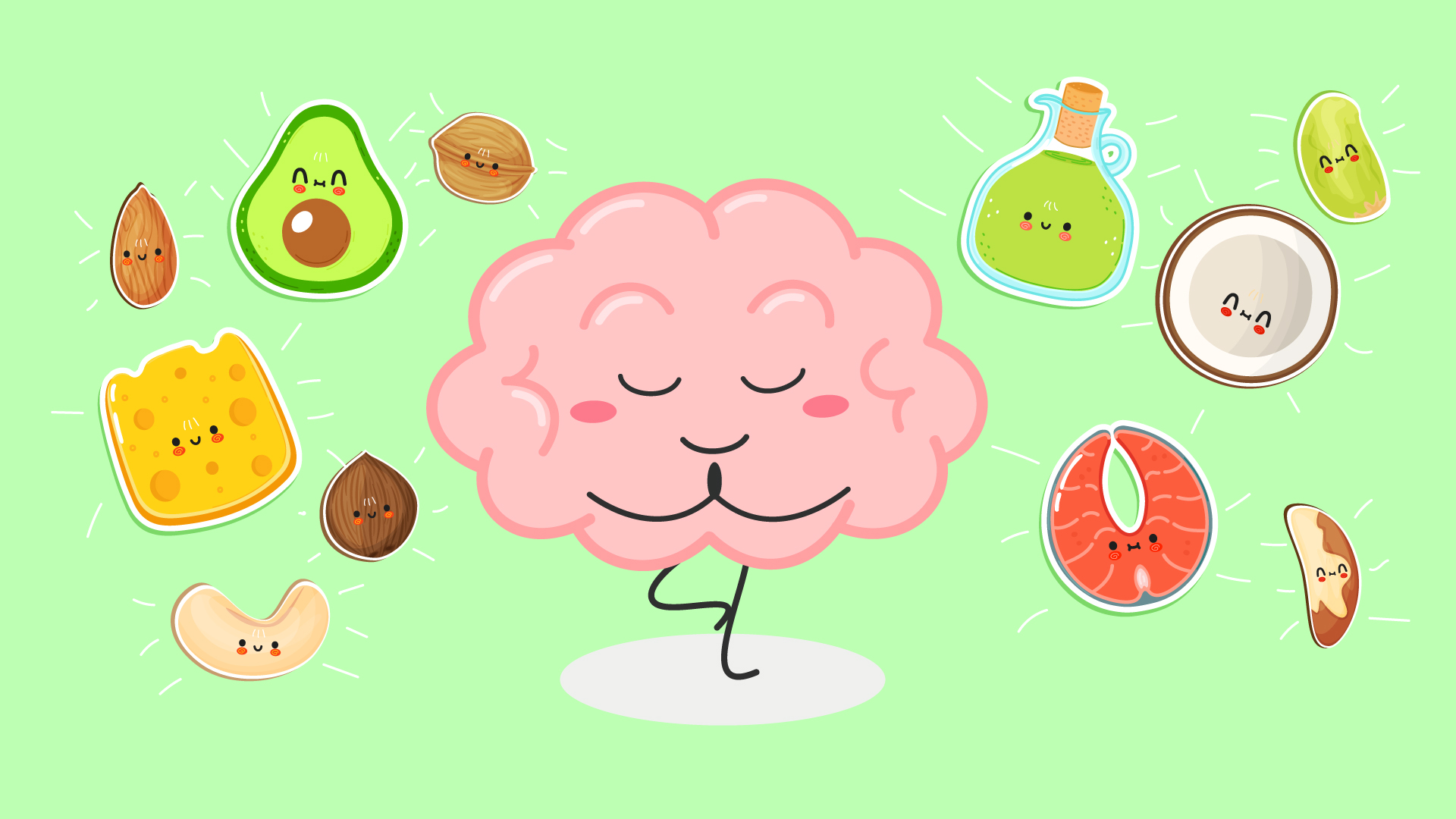Content Sections
By Meleni Aldridge, executive coordinator
Food is big business globally. Into the multiple trillions kind of big. Food is also something every human needs and can’t do without for very long, so it’s not surprising that corporate marketing budgets can be obscene and competition for consumer spend, intense, and often, dirty.
One of the dirtiest marketing campaigns in our recent history, that continues to wreak havoc on people’s health, surrounds the myths, lies, fallacies and omissions about dietary fats. This includes the fats we eat in our everyday diets like butter, cheese, cooking oils, nuts, avocados and meats.
Here are just a few you’ll have seen a lot in public messaging and the media. They all have one thing in common – they’re flat out wrong! But that doesn’t mean that they haven’t become deeply insinuated into the fabric of most people’s nutrition knowledge.
- Eating fats makes you fat!
- Fats cause heart disease because saturated fats are responsible for the build-up of plaque in the arteries (atherosclerosis) – the lipid hypothesis
- Dietary cholesterol raises cholesterol levels in the body (that’s why eggs keep getting a bad rap, not just in the media, but in the science too: here and here)
- Fats from butter, lard, meat and eggs are ‘bad’ fats
- The impression that all dietary fats behave the same because they’re loaded with calories; 9 calories (kcal) per gram, against 4 for both carbs and protein
- A low-fat diet is best for losing weight, as well as heart health
- Margarine is better than butter for heart health
- Yellow, refined, seed oils (e.g. corn, canola, rapeseed) are the healthier choice for cooking than animal-derived fats like butter and lard.
>>> Read Sally Fallon’s excellent article, ‘The Oiling of America’, on the Weston A Price Foundation website for the history of this dirty campaign that’s derailed human health for over a century – but made a fortune for Big Food, Big Pharma and Big Ag.
Fats for the brain
One of the greatest omissions in public health messaging about fats is that they’re essential for human health, and particularly brain health. It’s not your fault if you still feel a little hesitant when eating dietary fat, or confused about which fats really are healthy and which ones you should avoid. People have been subjected to a dedicated, targeted, mass conditioning over the last 40-50 years which presents dietary fats, some more than others, as a threat. The fact that they have been an essential macronutrient (unlike carbohydrates – but that’s another story) for at least 2 million years, and are responsible for ensuring our forebears’ survival (so we could be here), seems to have been neatly edited out of the science texts.
Thankfully, whilst there are scientists now trying to correct this aberrant information, the conditioning is pervasive, and still, we see corporate marketing machines plugging low and refined vegetable fats for all they’re worth. When faced with laden supermarket shelves, a confused person will generally err on the side of their conditioning, which is why so many low-fat products are still flying off the shelves, along with hydrogenated margarines, now with added plant sterols for heart health. The fats might be out, but it’s the substitutions that concern so many of us. This is how it works: out go the fats – even the healthy ones that our bodies’ need – and in go the refined carbs, sometimes including sugars, and very often the artificial sweeteners that play havoc with our nutrient sensing systems and hormones.

The downstream effect of so many decades of low-fat food, hydrogenated margarines and refined vegetable oils is seen in the exponential rise of brain degenerative disease (Alzheimer’s, dementia, brain fog, poor memory, neurodegenerative conditions etc) and mental health challenges. Low mood, depression and anxiety are all very much impacted by nutrition and lifestyle because brain health matters.
Did you know that three quarters of your brain is made of fats – animal fats, not hydrogenated or refined vegetable fats! Our brains particularly thrive on essential fatty acids (EFAs) and are needed to maintain brain integrity and its ability to perform. EFAs can’t be made in the body, meaning that we must take them in from our food, but if we’re fearful of animal or fish fats, or we’re vegan or vegetarian, we risk starving our brain of its most essential fuel – DHA or docosahexaenoic acid.
Common fats found in brain tissue include:
- Omega-3 fatty acids
- Omega-6 fatty acids
- Cholesterol
- Monounsaturated fats
- Polyunsaturated fats
- Saturated fats
- Docosahexaenoic acid (DHA)
- Eicosapentaenoic acid (EPA)
Good food sources for brain-healthy fats include:
- Fatty fish e.g. salmon, mackerel, sardines – omega 3 EFAs providing both DHA and EPA
- Nuts e.g. walnuts, almonds, macadamias, brazils, pecans, hazelnuts, pistachios (NB: peanuts and cashews are legumes, not real nuts) – monounsaturated and polyunsaturated fats
- Seeds e.g. pumpkin, sunflower, chia – omega 6 EFAs
- Avocados – monounsaturated and polyunsaturated fats, a little saturated fat
- Olive oil – monounsaturated fats
- Coconut oil – monounsaturated and polyunsaturated fats
- Eggs – cholesterol and saturated fat
- Animal proteins e.g. meat and chicken – saturated fat, a little cholesterol
- Lard – saturated fat, a little cholesterol
- Butter, ghee – saturated fat, a little cholesterol
If you read Sally Fallon’s article, ‘The Oiling of America’, referenced earlier, you will know that the rise in brain diseases, emotional disorders and neurodegenerative disorders has followed the timeline from when the public was asked to drop animal fats and replace them with vegetable fats.

You may also want to check out Zoë Harcombe and colleagues’ ground-breaking meta-analysis published in the journal Open Heart (2015), that shows that the dietary fat guidelines brought in during the late ‘70s and early ‘80s were lacking in any scientific evidence.
Getting fat-happy – and brain healthy
Healthy fats are essential for the production of neurotransmitters, which are chemical messengers that send signals from one nerve cell to another and allow communication between different parts of the brain and body. Well known neurotransmitters include dopamine, serotonin, GABA, norepinephrine and glutamate. Without adequate amounts of the right kinds of fats, neurotransmitters aren’t able to effectively send signals, which can lead to neurological and mental health issues that can range in severity.
Think about your neurotransmitters like the well-trained players in a ball team. Everyone is skilled up, knows their role on the team and at peak function, are on a winning streak. Dopamine, serotonin, GABA, and glutamate are neurotransmitters in the brain that work together to regulate the brain’s chemical environment. Dopamine and serotonin are mainly involved in the regulation of mood, emotion, and motivation, while GABA and glutamate are mainly involved in regulating how fired up and excited we get (neuronal excitability) and then how easily we can calm down again. GABA is the calming player (an inhibitory neurotransmitter), which helps control the excitability of neurons and reduces anxiety and stress. But glutamate plays an opposite role, meaning it helps increase neuronal excitability and can help with focus and concentration, as well as motivation. When our ‘neurotransmitter team’ is in balance, they each help create the necessary conditions for healthy mental functioning. But the opposite is true too.
Levels of our happy hormone, serotonin, that also regulates executive function in the brain (cognitive processing, problem-solving) and a wide range of behaviours, are dependent on having sufficient marine omega 3 EFAs and vitamin D available. From an evolutionary perspective, both of which were in plentiful supply for our forebears, who didn’t suffer from the kinds of neuropsychiatric, neurodegenerative or mental health conditions that are common today. Optimising intake of omega 3 EFAs (ideally marine source) and vitamin D levels has a positive effect on brain health and feeling happy, as well as improved sleep.

Omega 3 healthy fats, particularly the EPA component, helps to reduce inflammation, which is known to be associated with decreased serotonin levels. Inflammation – inflammaging – is also a key driver of brain degeneration, which is why a diet that’s deficient in essential fatty acids is a diet that’s also driving the brain disease epidemic that we’re witnessing daily.
A diet rich in polyunsaturated fats, monounsaturated fats, and omega-3 fatty acids can help to protect the brain cells from damage caused by inflammation and oxidation, both of which can lead to cognitive decline and other age-related degenerative diseases.
Let’s not forget that the brain’s preferred fuel source throughout evolution has been ketones, which are made in abundance from a diet that’s rich in healthy fats, but extremely low in starchy carbs and sugars. Ketones provide potent, clean-burning fuel for the brain so that it can perform optimally and develop new brain cells as needed.

>>> Interested in the role ketones play in your health? Read our book RESET EATING which is information-rich, but also takes you through a step-by-step life changing nutrition programme (including recipes!) to help you keto-adapt and develop metabolic flexibility. It’s time to become abundantly and vibrantly healthy by living life the FlexiKeto way!
A last takeaway...
Eating a diet rich in healthy fats is essential for brain (and emotional) health because, apart from everything we’ve discussed, they also provide the building blocks for cell membranes, which are vital for the communication between neurons. We need healthy fats to produce hormones, which regulate our mood as well as our overall brain health. Healthy fats also help to protect the brain from oxidative damage caused by daily living as well as excess inflammation – this too can lead to mental health issues. Lastly, healthy fats provide energy for the brain and help to keep it functioning optimally.
Further reading
>>> Time to demonise low fat instead of sat fat?
>>> How to spot a sat fat dinosaur?
>>> Fat - probably the least understood endocrine organ
>>> ANH International Food4Health campaign
>> Feel free to republish - just follow our Alliance for Natural Health International Re-publishing Guidelines
>>> If you’re not already signed up for our weekly newsletter, sign up for free now using the SUBSCRIBE button at the top of our website – or better still – become a Pathfinder member and enjoy benefits unique to our members.
>>> Return to homepage








Comments
your voice counts
03 March 2023 at 4:54 pm
There is an abundance of mis-information churned out to the consumer via Big Food/Big Dairy/Big Pharma marketing gurus - and millions of peeps sub-consciously swallow the hype. We need to avoid OXIDISED fats & oils - both plant and animal sourced. Fast food kitchens don't change the oil in their deep fry pans frequently enough. Our own research discovered that fish & chip shops (for example) top-up the old oil as the level drops, rather than completely draining off the oxidised oil at least once each week as they should.
In addition, the average Western diet contains far too much Omega-6 and too little Omega-3 & Omega-7. It is unfortunate that the word 'FAT' creates negative thoughts in the minds of uneducated consumers.
Your voice counts
We welcome your comments and are very interested in your point of view, but we ask that you keep them relevant to the article, that they be civil and without commercial links. All comments are moderated prior to being published. We reserve the right to edit or not publish comments that we consider abusive or offensive.
There is extra content here from a third party provider. You will be unable to see this content unless you agree to allow Content Cookies. Cookie Preferences